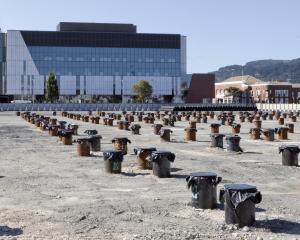If the University of Otago paid rates as private commercial and residential owners do, they would pay several million dollars. Other Dunedin City Council and the Otago Regional Council ratepayers, as a consequence, would all pay substantially less than at present.
But the university, like other government-owned institutions - the hospital, schools, Otago Polytechnic - is exempt by law from general rates. If at least some contribution could be made, the burden on others would lessen.
The matter has come into focus with the purchase of the Living Space hotel in Castle St for student accommodation.
By this single action, council's income from the property reduces by $17,123 a year. University properties are liable for water and drainage rates and charges, but not for general or community services rates, which cover all sorts of other council costs.
These can amount to well over 50% of rates' bills. Given the university's extensive holdings, it is easy to see how figures quickly mount.
Recent acquisitions by the university include the former Bowling Green and Gardens taverns in North Dunedin. Again, the rate-take is clipped.
As well, the university has been buying more flats. Again fewer Dunedin properties pay general rates, and everyone else pays more.
As Cr Syd Brown, chairman of the city council's finance, strategy and development committee, said, lost income needed to be weighed against the benefits accrued by the city when the university moved to protect its position and its ability to attract more students. Nevertheless, the pattern would be a ''major concern'' if it continued to squeeze the council's income, he said.
We, too, are acutely aware of the dilemma. Without a prosperous university, the city is in deep mire. It has been estimated 62% of the jobs in Dunedin are education or health related, and many more flow from there. The most recent report from the university says it boosted Dunedin's economy by $779.33 million in 2011.
When the law is on the university's side - and the Government as major funder of education and health has no incentive to change it - and because it competes for students, why would the university pay when there is no requirement?
Nevertheless, a contribution would be helpful and worthwhile. After all, the relationship between the city and the university works both ways.
It is essential the university attracts first-year students and private businesses have not moved into the college market. Perhaps, for Dunedin's sake, the exemption for colleges should stay.
There are also arguments the lecture theatres and administration buildings should be free from general rates because of the massive university contribution to the city.
But one area of the law is unfair and should be changed. When the university buys houses it competes directly with private landlords but has the competitive advantage of not paying rates.
The students in these flats, as in the colleges for that matter, do use council amenities without a rates contribution being paid, and all these residents are directly part of the city fabric. Ironically, the university was a strong supporter of a new covered stadium but has avoided paying towards it through rates as other businesses and householders do.
The Otago Regional Council does not have the opportunity to levy rates for what it provides - like bus subsidies - because its services are indirect. When yet another property is bought by the university, income disappears, which other ratepayers have to meet.
The issues are especially stark for the Leith flood protection scheme, which is estimated to cost $38.3 million. In the area being rated for this, 46% by capital value (the way rates are levied) is non-rateable. And most of this, 39%, is Crown non-rateable property.
The university has the most to gain from an effective scheme, yet is obliged to pay nothing, including for its scores of flats. The costs fall on everyone else, although the university is negotiating to pay a relatively small amount for Leith ''environmental enhancement''.
In Living Space's case, the council will abruptly lose $9844 in rates, of which $4818 was for the Leith scheme.
There are no easy answers, and all possible support must be given to the university. But the time has probably come for the university to pay full rates on its residential properties.












